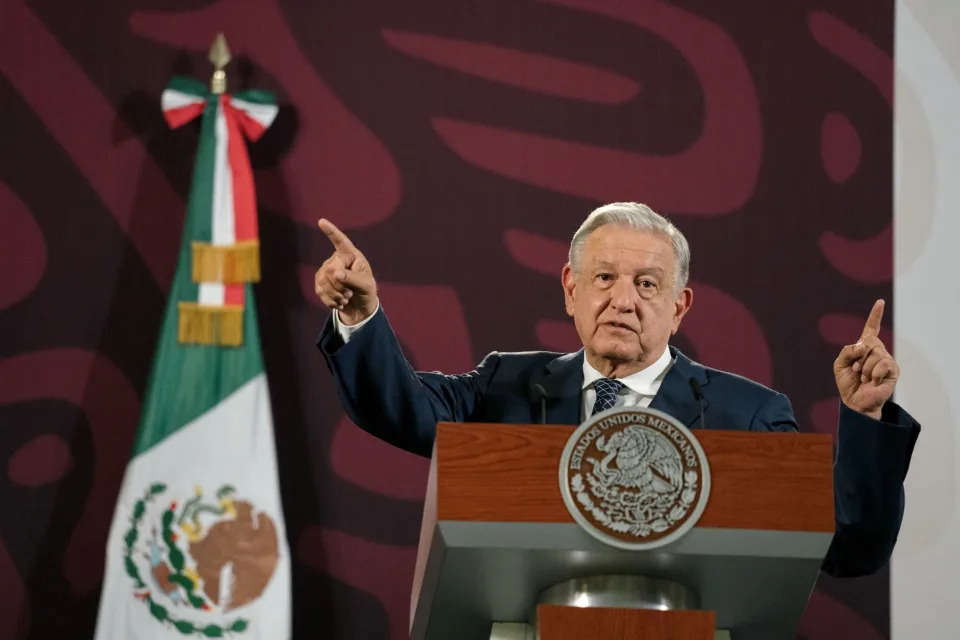(Bloomberg) -- Claudia Sheinbaum has spent the final weeks of her time as Mexico’s president-elect offering few specifics about how she will approach the major economic questions her predecessor is leaving behind. Markets are hoping she uses her first speech as the nation’s president to change that.
Investors will scour Sheinbaum’s Tuesday inaugural address for clues about her plans for Latin America’s second-largest economy, including a yawning budget deficit and a judicial overhaul that sent the currency into a tailspin in the closing stages of Andres Manuel Lopez Obrador’s six-year term.
They are particularly eager to see if Sheinbaum will begin to put some distance between herself and her political mentor, after a transition period in which she remained largely in the shadow of the president known as AMLO while he pushed the controversial reforms through Congress.
“Markets are waiting to hear her speech, whether it’ll be positive after all of the negative noise that’s been coming out of Congress,” said Bertrand Delgado, the director for research and strategy at Societe Generale. “A lot of people want to see her take a protagonist space moving forward: She has to go out there, thank AMLO and say, ‘This is my government and I need space.’”
That would repeat AMLO’s performance from his election victory in 2018, when he calmed fears his campaign rhetoric had inspired by pledging in a speech to respect the autonomy of the central bank and maintain fiscal discipline. He later kept cordial ties to some key companies while scapegoating others throughout his presidency, and even condoned public-private collaboration on many of his flagship state projects.
Sheinbaum followed a similar approach after winning June’s election, emphasizing the importance of strong ties to the US, welcoming foreign investment and exercising fiscal restraint after her dominant victory.
But the transition period has reignited some worries among investors, especially after AMLO and Sheinbaum’s Morena party used expanded congressional majorities to approve his plan requiring the election of Mexico’s federal judges, including members of its Supreme Court.
The peso has weakened about 14% since the election, making it by far the world’s worst-performing major currency over that span.
Congress subsequently approved another reform that expands the role of Mexico’s military in civilian affairs, while a third proposal that would eliminate some independent regulators in favor of ministerial oversight is still under discussion.
AMLO last week seized a port and quarry owned by Vulcan Materials Co. just days before he left office, with the company alleging that the “unlawful” act will have chilling effects on US-Mexico trade and investment relations. The surprise departure of Deputy Finance Minister Gabriel Yorio from the government on Friday, meanwhile, renewed concerns about Mexico’s fiscal trajectory as it faces its largest budget deficit in nearly 40 years.
Sheinbaum has not commented publicly on the Vulcan dispute and is unlikely to during her speech, but markets are eager for details on whether she will seek to deepen economic ties with the US and adopt more business-friendly policies toward the private sector, Delgado said.
“Public-private partnerships are key, especially to develop infrastructure,” he said.
She has similarly avoided talk of fiscal reforms in the wake of AMLO’s expanded spending and support for state-owned oil producer Pemex, leaving investors hoping she will begin to address the situation during her speech.
“In economic terms, I’m not expecting much” from the first address, said Rodolfo Navarrete, head of economic analysis at Mexican brokerage Vector Casa de Bolsa. “The only thing I’m waiting for is an orderly plan for how she’ll reduce the fiscal deficit. It all depends on how much revenue she manages to bring in.”
A business-friendly approach could help the beleaguered peso, pushing it close to 18.60 per dollar after it began the week around 19.70, Delgado said. A tone investors interpret as negative, he added, may threaten to weaken it beyond 20.
Many of the answers investors are looking for likely won’t come for weeks, as the process of implementing AMLO’s reforms continues and Sheinbaum releases her first budget plan, which her government is due to submit to Congress by Nov. 15.
Investors will also monitor the drafting of secondary laws that will determine how the judicial reforms work, Delgado said, as Mexico sets rules for the election of thousands of judges across the country.
“Now it’s about the implementation,” Delgado said. “Is there a chance to improve the process of how these judges will be elected to avoid some of investors’ largest concerns?”
But given the mounting worries, it would be surprising if Sheinbaum doesn’t at least begin to offer more specifics about her economic approach Tuesday, said Adriana Ibarra, principal partner at law firm Baker McKenzie.
“She has to address the issue of economic growth because it’s stood out, and there have been so many news stories about the debt that the government of AMLO is leaving and the uncertainty that his constitutional reforms have created for investors,” Ibarra said. “She will have to touch upon it, even if only briefly.”


